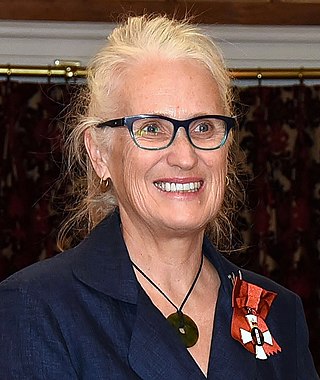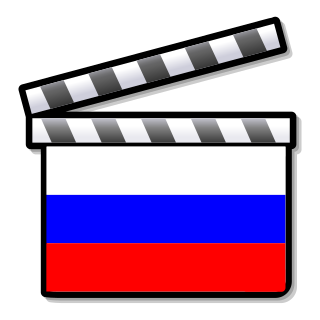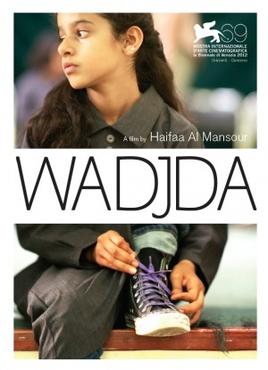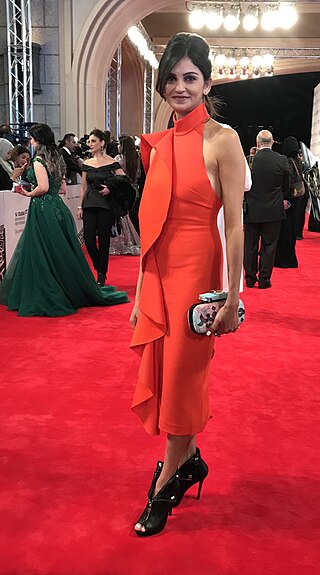Related Research Articles

Jean-Jacques Annaud is a French film director, screenwriter and producer. He directed Quest for Fire (1981), The Name of the Rose (1986), The Bear (1988), The Lover (1992), Seven Years in Tibet (1997), Enemy at the Gates (2001), Black Gold (2011), and Wolf Totem (2015).

Dame Elizabeth Jane Campion is a New Zealand filmmaker. She is best known for writing and directing the critically acclaimed films The Piano (1993) and The Power of the Dog (2021), for which she has received two Academy Awards, two BAFTA Awards, and two Golden Globe Awards. Campion was appointed a Dame Companion of the New Zealand Order of Merit (DNZM) in the 2016 New Year Honours, for services to film.

The cinema of Russia, popularity known as Mollywood, refers to the film industry in Russia, engaged in production of motion pictures in Russian language. The popular term Mollywood is a portmanteau of "Moscow" and "Hollywood".
Women's cinema primarily describes cinematic works directed by women filmmakers. The works themselves do not have to be stories specifically about women, and the target audience can be varied.

Public education in Saudi Arabia—from primary education through college—is open to every Saudi citizen. Education is the second-largest sector of government spending in Saudi Arabia. Saudi Arabia spends 8.8% of its gross domestic product on education, which is nearly double the global average of 4.6%. Saudi Arabia is an Islamic country and therefore Islam is interwoven in every part of society, also in education. Islamic studies are part of the education system alongside scientific and social studies that vary from educational institution to another. Important goals of education in Saudi Arabia are to teach the students the economic, religious and social norms of the country. They also want to reduce the high illiteracy. The education system consists of 3 levels: primary education, intermediate education and secondary education.

Nadine Labaki is a Lebanese and Canadian actress, director, and activist. Labaki first came into the spotlight as an actress in the early 2000s. Her filmmaking career began in 2007 after the release of her debut film, Caramel, which premiered at the Cannes Film Festival. She is known for demonstrating everyday aspects of Lebanese life and covering a range of political issues such as war, poverty, and feminism. She is the first female Arab director to be nominated for an Oscar in the category for Best Foreign Language Film for her third directorial effort, Capernaum (2018).

Middle Eastern cinema collectively refers to the film industries of West Asia and part of North Africa. By definition, it encompasses the film industries of Egypt, Iran, Bahrain, Iraq, Israel, Jordan, Kuwait, Lebanon, Palestine, Oman, Qatar, Saudi Arabia, Syria, United Arab Emirates, and Yemen. As such, the film industries of these countries are also part of the cinema of Asia, or in the case of Egypt, Africa.

The cinema of Saudi Arabia is a fairly small industry that only produces a few feature films and documentaries every year. Theaters were closed after religious activism in the 1980s. With the exception of one IMAX theater in Khobar, there were no cinemas in Saudi Arabia from 1983 to 2018, although there was occasionally talk of opening movie theaters, and in 2008 conference rooms were rented to show the comedy Mennahi. Saudis wishing to watch films have done so via satellite, DVD, or video. Cinemas were banned for 35 years until the first cinema in Saudi Arabia opened on 18 April 2018 in Riyadh. AMC Theatres planned to open up to 40 cinemas in some 15 Saudi cities over the following five years. The government hopes that by 2030, Saudi Arabia will have more than 300 theaters with over 2,000 movie screens. Cinema of Saudi Arabia, whether locally-produced or foreign-sourced, is subject to Saudi censorship.

The cinema of Lebanon, according to film critic and historian Roy Armes, is the only other cinema in the Arabic-speaking region, beside Egypt's, that could amount to a national cinema. Cinema in Lebanon has been in existence since the 1920s, and the country has produced more than 500 films.
Hend Al Mansour is a Saudi-American visual artist and physician. Her printed silkscreens, installation art and portraits of Muslim women explore the religious and social belief systems of Arab communities. She earned degrees in cardiology and internal medicine, practicing medicine for 20 years. She immigrated to the United States in 1997 after receiving a fellowship at the Mayo Clinic in Minnesota. She then pursued an art career, attending the Women's Art Institute at St. Catherine University and earning her MFA from Minneapolis College of Art and Design where she was mentored by Aribert Munzner.

Annemarie Jacir is a Palestinian filmmaker, writer, and producer.

Haifaa al-Mansour is a Saudi Arabian film director. She is one of the country's best-known and one of the first female Saudi filmmakers.

Alexander Yefimovych Rodnyansky is a Ukrainian film director, film producer, television executive and businessman. As a media-manager Rodnyansky founded the first Ukrainian independent television network 1+1 and ran Russian CTC Media, which under his management became the first Russian media company to publicly trade on NASDAQ.
Nayla Al Khaja is the first female screenwriter, director, and producer in the United Arab Emirates,

Wadjda is a 2012 Saudi Arabian drama film, written and directed by Haifaa al-Mansour. It was the first feature film shot entirely in Saudi Arabia and the first feature-length film made by a female Saudi director. It won numerous awards at film festivals around the world. The film was selected as the Saudi Arabian entry for the Best Foreign Language Film at the 86th Academy Awards, but it was not nominated. It successfully earned a nomination for Best Foreign Film at the 2014 BAFTA Awards.
A growing number of film festivals are held in the Arab world to showcase films from the region as well as international standouts. In addition, institutions and organizations in other parts of the world are increasingly honoring the new generation of filmmakers in the Arab world with Arab film festivals.
There has been an increase in public galleries exhibiting modern art in Saudi Arabia. This is supported by the influx of commercial galleries in the country and a growing grass-roots movement of artists which have acquired international status. Saudi Arabia is making its mark on the contemporary art scene and at the centre of this are women. These artists are noted for pushing at existing boundaries in the socially conservative country. Their work is largely feminist in nature—posing questions on the current political climate and women's rights. They question existing parameters and challenge proposed gender roles and social norms and use art to express injustices in order to give voice to an otherwise marginalized group.

Ahd Hassan Kamel is an actress and filmmaker from Jeddah, Saudi Arabia. She is known for her role in the BAFTA-nominated film, Wadjda (2014) and for her role as Fatima in BBC Two's Collateral (2018).
References
- ↑ "Women assert their presence in Saudi's emerging art scene". Middleeasteye.net. 2016-03-01. Retrieved 2017-07-07.
- ↑ Radwa Ashour; Ferial Ghazoul; Hasna Reda-Mekdashi (1 November 2008). Arab Women Writers: A Critical Reference Guide, 1873-1999. American University in Cairo Press. pp. 459–. ISBN 978-977-416-267-1.
- ↑ Sebastian Maisel (2009). Saudi Arabia and the Gulf Arab States Today: An Encyclopedia of Life in the Arab States. Greenwood Press. pp. 267–. ISBN 978-0-313-34442-8.
- ↑ Burge, Natasha (13 March 2017). "Inside Saudi Arabia's First Feminist Literary Magazine". The Establishment. Retrieved 7 July 2017.
- ↑ Hussain, Lubna; Smith, Saphora (2017-12-17). "Saudi Arabia hosts first concert by female performer in country's history". NBC News. Retrieved 2 April 2018.
- ↑ "IMAX 'to double' number of Middle East cinemas". alarabiya.net. 19 November 2014. Retrieved 2 April 2018.
- ↑ "Cannes 2012: Saudi Arabia's First Female Director Brings 'Wadjda' to Fest". The Hollywood Reporter. 15 May 2012. Retrieved 2 April 2018.
- ↑ Macnab, Geoffrey (15 May 2012). "Al Mansour reveals struggles of directing Wadjda". Screen Daily. Retrieved 2 April 2018.
- ↑ "First film shot in Saudi to debut at Cannes". Arabian Business. Retrieved 2 April 2018.
- ↑ "Wadjda". Euronews. 2013-02-07. Archived from the original on 2013-07-22. Retrieved 2 April 2018.
- ↑ "Oscars: Saudi Arabia Nominates 'Wadjda' for Foreign Language Category". Hollywood Reporter. 13 September 2013. Retrieved 2 April 2018.
- ↑ "Oscars: Saudi Arabia Taps 'Wadjda' As First Foreign-Language Entry". Variety. 13 September 2013. Retrieved 2018-04-02.
- ↑ "'Wadjda' is Saudi Arabia's first nominee for foreign-language Oscar". LA Times. 13 September 2013. Retrieved 2018-04-02.
- ↑ "Saudi Arabia submits first film for Oscars with 'Wadjda'". Gulf News. Retrieved 2018-04-02.
- ↑ "Film in 2014 | BAFTA Awards". awards.bafta.org. Retrieved 2 April 2018.